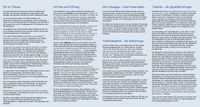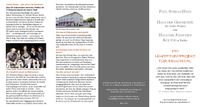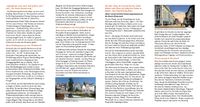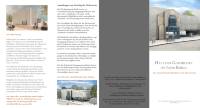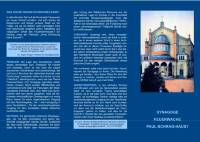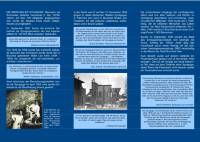From Bruchsal's Jewish History
In the town of Bruchsal, which belonged to the diocese of Speyer until the beginning of the 19th century, a Jewish community already existed in the Middle Ages and in modern times until 1938. Jews were mentioned for the first time in the Middle Ages in 1288. The persecution in the plague period of 1348 destroyed the Jewish community. It was not until 1381 that another Jew was taken in, and others were able to move in in the following years. In the 15th and 16th century the sources remain silent. Presumably there were only a few Jews in the city during this time.
Only since the time of the Thirty Years' War Jews lived again in Bruchsal, the first mention was 1619. 18 Jewish families were counted 1685 in the city, 1740 eleven families.
In 1809, the young Grand Duchy of Baden was the first state in Germany to recognise the Jewish religious community. In 1862, the Badische Judenedikt (Baden Jewish Edict) brought about equality of citizenship for Jews. As a result, the Jews of Baden became increasingly integrated into the majority society, including Bruchsal. For this reason, the Jews of Bruchsal were of great economic importance for the city from the middle of the 19th century onwards. The tobacco and hop wholesalers as well as the tobacco goods production and malt factories were largely in their hands. Several important industrial and commercial enterprises, such as the Falk stove factory, the Knopf department store or the Katzauer Brothers paint factory, were founded by Jewish entrepreneurs.
While 178 Jews still lived in Bruchsal in 1825 (2.6% of the total population), by 1880 there were already 730 Jewish fellow citizens (6.4%). In 1900, 741 (5.5 %) Jewish persons belonged to the city population, around 1925, 603 persons (3.7 %) belonged to the community.
During the First World War 18 men fell from the Bruchsal Jewish community.
Until the beginning of the Nazi era, the relationship between the Jewish and non-Jewish urban population was largely unproblematic. Jewish citizens were represented in the City Council (Stadtrat), the Citizens' Committee (Bürgerausschuss) and the District Council (Kreisrat) in Bruchsal. Through their membership they supported, among others, the Red Cross as well as singing, gymnastics and sports clubs. Like other Jewish citizens, Otto Schlossberger, father and son Bärtig were members of the Bruchsal fire brigade.
The Christian charitable institutions, mainly the Catholic and Protestant nurses, were supported by Jewish fellow citizens, for example the St. Josefshaus by Louis Oppenheimer.
Especially in the heyday of the Bruchsal carnival (Große Carneval-Gesellschaft Bruchsal, today Große Karnevalsgesellschaft e.V. 1879 Bruchsal (GroKaGe)) around 1900, many Jewish inhabitants also took an active part in the carnival events. The Jewish fellow citizen Otto Oppenheimer wrote the local anthem "De Brusler Dorscht" (The Bruchsal Thirst, Der Bruchsaler Durst) which is still sung till today, for his fellow carnival guests. Jacob Oppenheimer, a cloth wholesaler, known for his charity, enjoyed a great reputation far beyond the city. He was chairman of the Landeswaisenverein (helf for orphans), organised the war welfare collections in World War I and headed the municipal emergency aid in the winter of 1932/33. Jacob Oppenheimer died in September 1933 and received an honorary funeral and numerous obituaries from Jewish and Christian sides.
In 1933 501 Jewish inhabitants were counted in Bruchsal. The National Socialist agitation was also directed here immediately after the National Socialist seizure of power against the Jewish commercial and industrial enterprises in the city. Numerous restrictions restricted Jewish life in Bruchsal. From May 1934, for example, Jewish residents were no longer allowed to swim and sunbathe in the public swimming pool. In 1936, a separate school was established for Jewish schoolchildren. During the November pogrom in 1938, the synagogue was desecrated and burned to the ground, SA people smashed the shop windows of Jewish shops. On 22 October 1940, the last 79 Jewish inhabitants who remained here were deported to Gurs. Most of them died in Gurs or were murdered in a concentration camp.
Text to: www.alemannia-judaica.de
